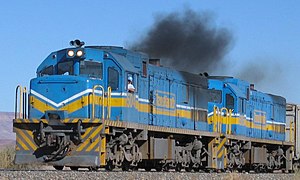South African Class 33-400
| South African Class 33-400 TransNamib Class 33 |
|||||||||||||||||||||||||||||||||||||||||||||||||||||||||||||||||||||||||||||||
|---|---|---|---|---|---|---|---|---|---|---|---|---|---|---|---|---|---|---|---|---|---|---|---|---|---|---|---|---|---|---|---|---|---|---|---|---|---|---|---|---|---|---|---|---|---|---|---|---|---|---|---|---|---|---|---|---|---|---|---|---|---|---|---|---|---|---|---|---|---|---|---|---|---|---|---|---|---|---|---|

Rebuilt TransNamib no. 504, ex no. 33-475, near Keetmanshoop, 2 September 2004
|
|||||||||||||||||||||||||||||||||||||||||||||||||||||||||||||||||||||||||||||||
|
|||||||||||||||||||||||||||||||||||||||||||||||||||||||||||||||||||||||||||||||
|
|||||||||||||||||||||||||||||||||||||||||||||||||||||||||||||||||||||||||||||||
|
|||||||||||||||||||||||||||||||||||||||||||||||||||||||||||||||||||||||||||||||
|
|||||||||||||||||||||||||||||||||||||||||||||||||||||||||||||||||||||||||||||||
| Type and origin | |
|---|---|
| Power type | Diesel-electric |
| Designer | General Electric |
| Builder | SA GE-DL Locomotive Group |
| Serial number | 36530-36644 |
| Model | GE U20C |
| Build date | 1968-1970 |
| Total produced | 115 |
| Specifications | |
|---|---|
| Configuration: |
|
| • AAR | C-C |
| • UIC | Co'Co' |
| • Commonwealth | Co+Co |
| Gauge | 3 ft 6 in (1,067 mm) Cape gauge |
| Wheel diameter | 915 mm (36.0 in) |
| Wheelbase | 12,243 mm (40 ft 2.0 in) |
| • Bogie | 3,505 mm (11 ft 6.0 in) |
| Pivot centres | 9,017 mm (29 ft 7.0 in) |
| Wheel spacing (Asymmetrical) |
1-2: 1,594 mm (5 ft 2.8 in) 2-3: 1,911 mm (6 ft 3.2 in) |
| Length: |
|
| • Over couplers | 16,866 mm (55 ft 4.0 in) |
| Width | 2,756 mm (9 ft 0.5 in) |
| Height | 3,931 mm (12 ft 10.8 in) |
| Axle load | 15,749 kg (34,721 lb) |
| Adhesive weight | 94,494 kg (208,324 lb) |
| Loco weight | 94,494 kg (208,324 lb) max |
| Fuel type | Diesel |
| Fuel capacity | 3,600 litres (790 imp gal) |
| Prime mover | GE 7FDL-12 |
| RPM range | 400-1,000 |
| • RPM idle | 400 |
| • Maximum RPM | 1,000 |
| Engine type | 4 stroke diesel |
| Aspiration | Elliott H-584 turbocharger |
| Generator | DC 10 pole GE 5GT-581C9 |
| Traction motors | Six GE 5GE-761A6 DC 4 pole |
| • Rating 1 hour | 635A |
| • Continuous | 620A @ 20 km/h (12 mph) |
| Cylinders | V12 |
| Gear ratio | 92:19 |
| MU working | 6 maximum |
| Loco brake | 28L-AV-1 with vigilance control |
| Train brakes | Westinghouse 6CDX4UC compressor/exhauster |
| Air tank cap. | 825 litres (181 imp gal) |
| Compressor | 0.029 m3/s (1.0 cu ft/s) |
| Exhauster | 0.116 m3/s (4.1 cu ft/s) |
| Couplers | AAR knuckle (SASKOP DS) |
| Performance figures | |
|---|---|
| Maximum speed | 100 km/h (62 mph) |
| Power output: |
|
| • Starting | 1,605 kW (2,152 hp) |
| • Continuous | 1,490 kW (2,000 hp) |
|
Tractive effort: |
|
| • Starting | 223 kN (50,000 lbf) @ 25% adhesion |
| • Continuous | 178 kN (40,000 lbf) @ 24 km/h (15 mph) |
|
Factor of adh.: |
|
| • Starting | 25% |
| • Continuous | 20% |
| Brakeforce | 70% ratio @ 345 kPa (50.0 psi) |
| Dynamic brake peak effort | 173 kN (39,000 lbf) @ 26 km/h (16 mph) |
| Career | |
|---|---|
| Operators | South African Railways Spoornet TransNamib Transnet Freight Rail Ferrovia Centro-Atlântica (Brazil) América Latina Logística (Brazil) Ferroviaria Oriental (Bolivia) Sociedad Química y Minera (Chile) Kumba Iron Ore Sudan Railways Zambia Railways |
| Class | Class 33-400 |
| Number in class | 115 |
| Numbers | 33-401 to 33-515 |
| Nicknames | Bosvark |
| Delivered | 1968-1970 |
| First run | 1968 |
The South African Railways Class 33-400 of 1968 was a South African and Namibian diesel-electric locomotive.
Between 1968 and 1970, the South African Railways placed 115 Class 33-400 General Electric type U20C diesel-electric locomotives in service. A large number of them were transferred to TransNamib, the Namibian Railways, upon South West Africa’s independence on 21 March 1990.
The Class 33-400 type GE U20C diesel-electric locomotive was designed for the South African Railways (SAR) by General Electric (GE) and built by the South African General Electric-Dorman Long Locomotive Group (SA GE-DL, later Dorbyl). The 115 locomotives were delivered between July 1968 and March 1970, numbered in the range from 33-401 to 33-515.
The Class 33 consisted of three series, the GE Classes 33-000 and 33-400 and the General Motors Electro-Motive Division Class 33-200. Both manufacturers also produced locomotives for the subsequent SAR Classes 34, 35 and 36.
The two GE-built Classes were virtually identical in appearance, but could be distinguished from each other by some ventilation openings on their bodywork.
These doors and panels could and sometimes did get swapped between models, either as replacement for damaged items or by chance during overhauls. An example is SCTP no. 1435, sold to the Congolese Company for Transportation and Ports (SCTP), illustrated below, of which the left-side door on the nose had apparently been swapped with that of their Class 33-000 no. 1436, illustrated alongside.
Upon being commissioned, a large number of the Class 33-400 locomotives were placed in service in South West Africa (SWA) while some went to the Mafeking line working out of Johannesburg. Forty-five of them were eventually transferred to TransNamib, the Namibian Railways, upon SWA’s independence on 21 March 1990. They retained their SAR engine numbers on the TransNamib roster, but without the "33-" prefix. Some have since been sold while others have been rebuilt with reconditioned prime movers by TransNamib's workshops in Windhoek and renumbered from no. 501 up.
...
Wikipedia
